Medicare fraud claims unsubstantiated
and comply with a complex system they cannot avoid, do not understand, and feel powerless to change. Without reform, the government can expect no improvement in leakage, increased litigation and out-of-pocket costs for patients and continued decreases in private health insurance uptake. Regulatory, educational, and digital reform are required urgently.”
Fraud unquantified
[medical practitioners] in Australia (Agency 2018/9). Given the quantum of non-compliant Medicare billing is 5–15% of the schemes’ total cost, non-compliance in that year was in the range of $1.2–$3.6 billion.”

Systemic issues
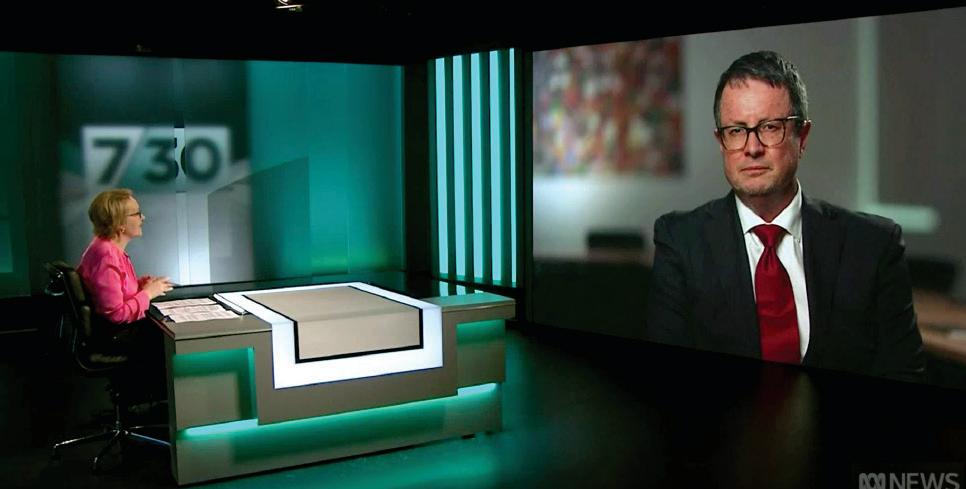
Recent news reports, jointly published by ABC News, The Sydney Morning Herald and The Age, blamed medical practitioners for a staggering $8 billion worth of Medicare fraud and waste, representing 30% of the Medicare Benefits Schedule (MBS) budget. One article began: “Doctors are abusing the $28 billion Medicare system, at times putting patients at risk, billing dead people and falsifying patient records, all to boost profits.”

The investigation was based on a published PhD thesis, ‘Claiming and Compliance under the Medicare Benefits Schedule: A Critical Examination of Medical Practitioner Experiences, Perceptions, Attitudes and Knowledge’. This thesis comprises a literature review on

medical billing fraud and noncompliance, a policy analysis, a quantitative survey of 66 identified stakeholders that were considered to provide Medicare billing education, and a qualitative survey involving in-depth interviews of 27 specialist and general medical practitioners.
Importantly, the thesis abstract concluded in the penultimate paragraph: “The research found that a principal cause of non-compliant Medicare billing in Australia is system issues, rather than deliberate abuse by medical practitioners. Medical practitioners have no choice but to try
There are only nine instances of the search term “Medicare fraud” in the thesis, of which six refer to specific case law pertaining to individual cases. The remaining three are general statements that are unquantified. A key acknowledgement by the thesis author (p77) is that “… quantifying the precise monetary value attributable to inappropriate claiming has proven an impossible task”. The author thus frequently (and appropriately) uses the word “estimate”. The only estimate of Medicare non-compliance, not a definitive number, is on p290 of the thesis: “In the 2018-2019 fiscal year, total Medicare expenditure was over $24 billion (Department of Health) and there were 118,996 registered
The results of the qualitative survey of 27 specialist and general medical practitioners that formed part of the PhD highlighted poor training in the mechanisms of billing, a lack of reliable support and the fear of being audited (p210). The doctors felt that they had little control over the billing process even though they were ultimately legally responsible. Participants always contacted Medicare if there was an over-billing mistake but rarely when there was under-billing (p220). This is reflected in the RACGP’s Health of the Nation report where 47% of doctors either avoided claiming rebates or providing certain services, again, through fear of a Medicare billing audit.
Therefore, the thesis findings describe non-compliant, not fraudulent Medicare billing. As stated elsewhere in the thesis, and the abstract, the principal causes
4, 2022 | Canberra Doctor is proudly brought to you by the AMA (ACT)
region
Doctor CANBERRA Rare and uncommon cancers rebateable from 1 November 2022
of
PET-CT, Cnr Broula & Allawoona St, Bruce Opening hours: Monday-Friday 8:30am-4:30pm qscan.com.au | p: (02) 6126 5080 Bulk billing all Medicare eligible PET-CT scans 75981 VOLUME 34, No. 4
Informing the
community since 1988 Continuedpage4
Issue
Limited. Circulation: 1,900 in ACT &
Informing the Canberra medical community since 1988
University
Canberra
CANBERRA DOCTOR:
Canberra medical
AMA President Professor Steve Robson told ABC’s 7.30 only a small number of doctors misuse Medicare.
President’s Notes
Goodwill abused
Since the last edition of Canberra Doctor, allegations of up to $8 billion worth of Medicare fraud, overservicing and wasteful practice have dominated large parts of the media. AMA and Professor Steve Robson pushed back hard against these unsubstantiated claims, and ultimately the news reports were shown to have been grossly exaggerated.

The scale of the alleged misuse came as a shock to many doctors, who are personally acquainted with so much self-sacrifice and goodwill in the practice of medicine. Many of us felt the figures just couldn’t be right, and the more you delve into those news reports, the more you see they were misrepresentative.
Unfortunately, the cheap shots came at time when meaningful Medicare reform could not be more critical, especially for primary care. The truth is that our hard-working and skilful GP specialists provide the best value primary health care in the country – whether it is wound care or mental health – and yet Medicare
rebates are woefully out of step with the costs of providing that care.
In the end, the scandalous headlines gave the AMA and other organisations a platform to raise awareness about the true crisis in our fortyyear-old Medicare system and what measures must be taken to fix it.
Pharma prescribing
Instead of coming up with real solutions to the shortage of GPs, governments to the north are experimenting with allowing pharmacists to write scripts for patients. Queensland’s pharmacy prescribing scheme is now well underway and NSW has announced it will begin its own pilot.
Rather than adequately funding general practice, politicians prefer to fund non-medical staff to make diagnoses and write scripts after completing a few hours of online training. Even the Queensland Government’s own deeply flawed UTI prescribing study was associated with a disturbing number of misdiagnoses and prescribing errors, according to an evaluation by the Queensland University of Technology.
Contrast this with a very successful pilot in the ACT not so long ago, which incorporated pharmacists into general practices. The model worked on the principle of integrating rather than fragmenting care and led to more medication reviews and a reduction in medication-related harms. Alas, the pilot finished and there was no further funding for practices to keep pharmacists onboard. Quality medicine that integrates care requires ongoing funding from government, and AMA will continue to advocate locally and Nationally for reform.
One thing after another
This time of year is among the busiest for our junior doctors and other medical staff, and it can be difficult to get locums. Throw into the mix the now fourth wave of Covid, and there is some trepidation among us all. Add to that the rollout of our new Digital Health Record with the to-be-expected glitches and it is starting to feel oppressive. Fingers crossed the long-term benefits of the DHR outweigh these early pains. What can we say? Now is the time to
focus on the things we can control, and not worry about the things we can’t.
Drs4Drs Safe Space
Speaking of which, AMA ACT hosted Drs4Drs ACT’s second Safe Space event at our offices in Barton last month. We have some truly wonderful colleagues working in the territory, who care about building a supportive culture among the profession. If you weren’t able to attend, I encourage you to read the wisdom from our presenters on pages 8 and 9 about how to better care for yourself and your staff. AMA ACT is putting together a model for professional wellbeing and resilience for doctors in the ACT based on the seminar and survey feedback we have received. Stay tuned.
Enterprise Agreement
While things seem to have slowed down in the negotiation of the next Enterprise Agreement for our public hospital doctors, the good news is that the Government has made a pay offer. The offer is aimed mainly at lower paid workers, but for our Doctors in Training in particular, it seems a decent
outcome. AMA ACT remains confident that we will be able to negotiate a support package for doctors in training that includes enhanced training and education allowances and better access to paid leave.
Art In, Butt Out
Congratulations to Melba Copland Secondary School student Antonella Zlatar on winning AMA ACT’s 15th annual Art In, Butt Out competition. Art In, Butt Out is an opportunity for high school students to create a poster that discourages their peers from taking up smoking. It was great to see so many young people’s thoughtful entries to a competition with such a worthy cause.
Graduation breakfast

All AMA ACT members are invited to join AMA ACT’s annual Graduation Breakfast at Hotel Realm at 8.30am on Friday 16 December. The event is free to all AMA members and graduating students of the ANU Medical School. Please come along and celebrate this year’s graduates and enjoy one another’s company at one of the social highlights of the year.




VALE
The President, Professor Walter Abhayaratna, Board members and staff of AMA (ACT) extend their sincere condolences to the family, friends and colleagues of Dr Edward Flemming


VALE
The President, Professor Walter Abhayaratna, Board members and staff of AMA (ACT) extend their sincere condolences to the family, friends and colleagues of Dr Heather Lopert
[2]
ISSUE 4, 2022
CANBERRA DOCTOR: Informing the Canberra medical community since 1988
Health Minister Rachel Stephen-Smith with students who entered the AMA ACT’s 15th Annual Art in, Butt Out competition.
MEETING DOCTORS’ NEEDS 9 Professional, timely reports 9 Short wait time on referrals 9 Priority placement for urgent diagnosis Commission & Sales Target Free Local and Independent since 2004 DEAKIN • BRUCE • HARRISON • ERINDALE QUEANBEYAN www.hearingandspeech.com.au Helping Canberra Communicate
WITH PRESIDENT, PROFESSOR WALTER ABHAYARATNA
Health providers get ready for drug decriminalisation
What is a small quantity?
The Drugs of Dependence (Personal Use) Amendment Bill 2021, defines small quantities as:
DRUG SMALL QUANTITY
amphetamine 1.5g cocaine 1.5g methylamphetamine 1.5g
Are Canberra’s health providers ready for the flow-on effects of the ACT Government’s decriminalisation of possession of small quantities of drugs such as cocaine, MDMA, ice and heroin? Associate Professor Jeffrey Looi, Head of the Academic Unit of Psychiatry & Addiction Medicine at the Australian National University (ANU) School of Medicine and Psychology, says there are reasons to be optimistic.
From late October 2023, the possession of small amounts of certain illicit drugs will be decriminalised. This means people will no longer be exposed to potential prison sentences and instead be issued a $100 fine or referred to an illicit drug diversion program.
Announcing the passage of the Drugs of Dependence Amendment Bill last month, Health Minister Rachel Stephen-Smith said the reform would reduce the stigma and fear for people who are using drugs to access health services.

A/Prof Looi told Canberra Doctor he believed the change would be good for patients and the community if it led to people seeking assistance through the drug court system rather than concealing their usage. He also said health providers in Canberra were relatively well equipped to deal with the change.
“The feedback from our clinicians, is that ACT is fairly well placed to provide specialist Drug and Alcohol support relative to other jurisdictions,” he said.
In addition, he said doctors with a medical degree from ANU received more Drug and Alcohol training on average than graduates of other universities across Australia, including teaching, examination and placements in Addiction Medicine.
“ANU graduates are relatively well trained in how to help patients with addiction issues compared to other jurisdictions,” he said.
Concerns remain However, there remain at least two main question-marks about decriminalisation. A/Prof Looi observed firstly that the evidencebase on decriminalisation is primarily limited to the experience in Portugal, which has an effective drug diversion program.
“In Portugal it was found there was no increase in substance abuse, and referral to drug diversion was effective in linking to Addiction Medicine health services,” he said. “This is also embedded in Portuguese societal discouragement of substance abuse.”
However, A/Prof Looi commented: “As Portugal is a very different country and society to Australia, some of this decriminalisation model may be lost in translation.”
The second question for Professor Looi is whether GPs have enough support. “We really need to make sure our GPs have the support they need, as they are likely to bear the brunt of any increase in patients with addiction seeking help,” he said.
A/Prof Looi said the health, social and legal impact of the Government’s
new laws must be prospectively and systematically evaluated.
Canberra Liberals deputy leader Jeremy Hanson has condemned the reforms, saying the community wasn’t adequately consulted.
“It’s going to lead to more crime. It’s going to lead to more carnage on our roads,” he told the ABC
“It’s not going to change the number of people going into the criminal justice system, and it’s not going to fix the problem that we have now, which is not enough people being able to access treatment.”
Counting down
However, Ms Stephen-Smith said the reform was the logical next step in the Government’s commitment to delivering evidencebased and practice informed harm minimisation responses to alcohol and other drug use.
The Government says it will take the next 12 months prior to the reform commencing to implement oversight arrangements, deliver training for frontline workers, including police and develop public and targeted communications with ACT Policing, the alcohol and drug sector, academic experts and people with lived experience.
MDMA 1.5g or 5 units 0.3g cannabis (dried) 50g cannabis (harvested) 150g heroin 1g
lysergic acid 0.001g or 5 units 0.0002g LSD, LSD-25 0.001g or 5 units 0.0002g psilocybine 1.5g
Survey on vax views
The World Federation of Public Health Associations (WFPHA) is conducting research on the impact of the pandemic on healthcare professionals’ views on vaccination.

The WFPHA is particularly interested in seeking to understand any sentiment changes concerning the COVID-19 and seasonal flu vaccinations.
The WFPHA invites all health professionals to fill out its survey and share their opinion. The survey is open to, but not limited to, public health professionals, physicians, nurses, dentists, nutritionists, social and community health workers working in any setting.
Go to surveymonkey.co.uk/r/Australia_vaccination_sentiment
[3] ISSUE 4, 2022
CANBERRA DOCTOR: Informing the Canberra medical community since 1988
Decriminalisation may lead drug users to seek help rather than conceal their habit.
Three ways to fix Medicare
anecdotes, simplistic analysis and opinion, rather than any rigorous data or comprehensive statistical analysis. This goes someway to explaining the utter puzzlement of the medical profession, and the federal government for that matter, at the suggestion.
PROFESSOR STEVE ROBSON AMA President
Medicare. It’s perhaps Australia’s most treasured piece of public policy. The green and gold card is practically part of the Australian identity. As well it should be.
Introduced by the Hawke government, the insurance scheme has helped millions of Australians over the better part of 40 years, to access high quality, affordable healthcare.
It’s completely understandable, therefore, that when allegations of $8 billion being wasted in fraud are made, national attention is swift and condemnation fierce. If only it were true.
The suggestion that $8 billion (around 30%) of the spend on Medicare is being defrauded has been shown to be based on
The ROADSAFE Study
But it’s completely understandable that Australians responded this way, when presented with these figures as “facts”. We’ve seen Medicare used as a political football before — through five years of a Medicare freeze as a savings measure — pushing costs away from government and onto patients.
And we’re seeing pressures on general practice like never before, with increasing out-of-pocket costs as the Medicare patient rebate falls further and further behind.
Clearly change is needed. Doctors and the community know this. From the AMA’s perspective, to achieve this change it’s critical we do three things.
Increase funding
Firstly, we do need to increase the funding to Medicare. At the beginning of the year the patient’s rebate for a regular GP consult
The Australian Road Safety Study for Older Adults
was $39.10. After indexing it in July, it is now $39.75. That’s not going to do much in an inflation environment of around 7%. Something is broken here.
Stamp out fraud
Secondly, we need to continue to stamp out any fraud, mistakes, and wastage — something the AMA (with the wider profession) has dedicated a significant amount of its resources to over many years.
Over 700 clinicians gave up their time to be part of a fiveyear effort to review the entire Medicare system, through the MBS Review. You don’t do that if you’re not interested in protecting the system from misuse.
In recent years we have backed legislative reforms to increase Medicare audit and compliance powers, making it easier for Government to tackle allegations
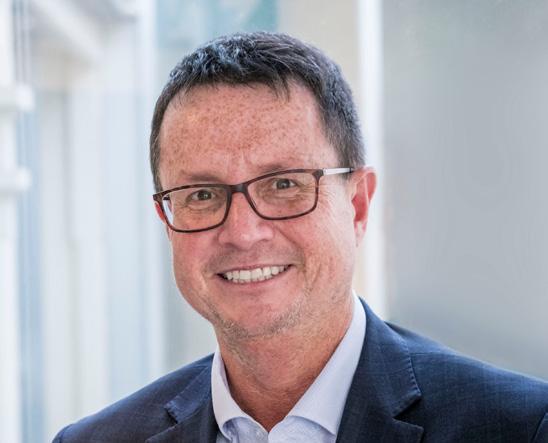
of Medicare fraud. The specific cases being quoted in the media are largely those that have been detected under the current compliance and audit regime, showing the system is working.

We’ve been regularly consulted on the Department of Health’s education program — helping to shape letters to practitioners on Medicare by using the Department’s advanced data analytics to support practitioners who genuinely struggle to understand often complex Medicare rules.
Where issues of fraud appear, we’ve worked with the government’s compliance and risk program, alerting them to issues, and supporting efforts to quickly address any inappropriate and unethical use — including where necessary through referral to the Professional Services Review. The AMA always has, and always will, have a strong stand on our role as stewards of the system.
Are you a registered General Practitioner (GP)?
We are seeking GPs who have experience in assessing driving capacity in older adults, including cognitive function and how it relates to driving
Participation in this study involves a 20 minute interview via telephone. Responses will be stored anonymously. You will receive a $50 online WISH Gift Card for your time.
If you are interested in participating, please scan the QR code and complete the online registration form.


For more information, please contact Dr Kayla Stefanidis on 5430 1166 or email (ROADSAFE@usc.edu.au )

University of the Sunshine Coast Ethics Approval (HREC A211678)
Continuedfrompage1
of non-compliant Medicare billing are systemic issues, rather than deliberate abuse by medical practitioners. In fact, much of the focus of the thesis was on the appropriateness of Medicare billing in territory or state-run health facilities (pp238-255), which is a quite different but legitimate issue.
1 in 1000 doctors
In commenting on the media stories, Professor Julie Quinlivan, former Professional Services Review (PSR) Director has stated that the investigations published on the PSR website were substantiated as 1 in 1000 of medical practitioners, not one in three, the level claimed in the news report to support
$8 billion in fraud and waste.
In conclusion, we were unable to find any substantive evidence-base within the published thesis for media claims of $8 billion in fraud and waste by medical practitioners, representing 30% of the MBS budget.
This episode is instructive in how to improve reporting of important medical news. Quoted academic sources must be systematically reviewed, and suitably qualified independent researchers asked to comment on the evidence. In this way, medical news can better inform public and political discourse on this important topic.
JEFFREY LOOI1,2, STEPHEN ALLISON2,3,
Modernise Medicare
Thirdly, much of the recent debate has centred on how complicated, confusing and convoluted the system is. We’d agree. It’s why the AMA is running a campaign called “Modernise Medicare”, focussed on reforming the system to fund co-ordinated, multidisciplinary care under one roof.
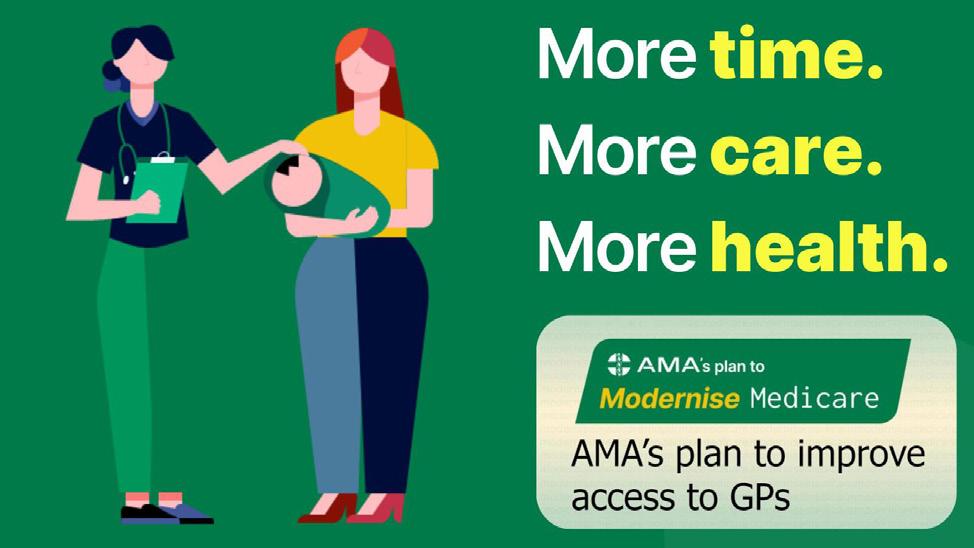
You shouldn’t have to bounce around the health system to see a doctor, a nurse, an allied health specialist. It’s a travesty those with chronic wounds can’t afford bandages to take to the GP, because we don’t fund it as a nation. We don’t fund GPs to make it sustainable to be open after hours, while also expecting them to devote huge of amounts of their time to completely unfunded healthcare delivery, because the ‘system’ hasn’t kept up with Australian’s healthcare needs.
One of the very few areas of the recent media coverage we do agree with is that there is more work to be done.
There are important issues to be debated relating to the health system, including the pressures placed on that system by an ageing society, rising chronic disease rates and the long tail of COVID-19 in the community. I can only hope we have the political will to invest in Medicare as it is needed, and the opportunity to have a truthful public debate about these issues.
PAUL A. MAGUIRE1,2, TARUN BASTIAMPILLAI2,3,4, STEPHEN R. KISELY2,5,6
Author affiliations
1. Academic Unit of Psychiatry and Addiction Medicine, The Australian National University School of Medicine and Psychology, Canberra
2. Consortium of Australian-Academic Psychiatrists for Independent Policy and Research Analysis, Canberra
3. College of Medicine and Public Health, Flinders University, Adelaide
4. Department of Psychiatry, Monash University, Melbourne
5. School of Medicine, The University of Queensland, Brisbane
6. Departments of Psychiatry, Community Health and Epidemiology, Dalhousie University, Canada
References can be provided upon request.
[4] CANBERRA DOCTOR: Informing the Canberra medical community since 1988 ISSUE 4, 2022
Evidence clear pharma prescribing a grim step
With pharmacy prescribing now well underway in Queensland, other states and territories will come under increasing pressure to follow suit. AMA strongly opposes the development, which puts patients at risk and does nothing to fix workforce issues in regional and rural areas, despite the Queensland Government’s claims.
AMA President Professor Steve Robson said: “The AMA is completely opposed to pharmacy prescribing with good reason. While we know pharmacists play a really important role in the health system, they are not qualified to diagnose patients.”
So what does the evidence show about pharmacy prescribing?
Money talks
First, money talks. The Pharmacy Guild of Australia, which represents retail pharmacy owners, donated $88,000 to branches of the Australian Labour Party in 2020-21. The Queensland branch of the ALP received 40% of the Guild’s total donations to the party, about $36,000.

No surprises then, that at a Guild parliamentary reception last month, the Queensland Health Minister announced that the Government was pressing ahead with plans to expand pharmacy prescribing.

The North Queensland Pharmacy
Scope of Practice Pilot, commencing in mid-2023, will allow pharmacists to administer vaccines and prescribe medications for nausea and vomiting, reflux, rhinitis, mild skin conditions and acute mild musculoskeletal pain.

But as AMA Queensland Vice President Dr Nick Yim, a former pharmacist observed: “Getting a diagnosis and prescription from a chemist while doing the weekly grocery shopping may seem more convenient than seeing a GP, but it’s like fast food – it’s not good for you in the long-term.”
Dispensers prescribe more
The evidence from the Queensland Government’s own pilot of pharmacy prescribing for patients with suspected Urinary Tract Infections (UTI) should raise serious concerns, despite the Government’s claim that it was a success.
The Government has just made the UTI program a permanent
initiative, enabling pharmacists to diagnose and sell antibiotics to women with potential UTIs after completing two hours of online training. However, the pilot was plagued by methodological flaws. Furthermore, it’s findings support the AMA and others’ warnings that there is a conflict of interest when the dispenser is also the prescriber – one that creates the perfect environment for over-servicing.
Here’s what we know about the pilot:
Of about 8,000 women who
took part, only 3,500 had contact details for follow-up
Follow-up was done by the pharmacist who provided the service
97% of women were prescribed antibiotics
One in two pharmacists said they would have found it difficult to charge the consultation fee ($19.95) without also selling antibiotics
At least 270 women needed
further treatment from a doctor due to misdiagnosis, antibiotic allergy or resistance
Most services were delivered in cities and major regional towns in business hours, not after hours or in rural and remote areas, despite claims the initiative improves access to healthcare in under-serviced areas
AMA Queensland invited doctors across the state to report on their experiences with patients treated under the pilot and received
[5] ISSUE 4, 2022
CANBERRA DOCTOR: Informing the Canberra medical community since 1988
Queensland Health Minister, Yvette D’Ath with the Pharmacy Guild’s Professor Trent Twomey (left) and Chris Owen (right) in 2021.
Continuedpage6
Keep on top of MBS changes with the
AMA Fees List
What is the AMA Fees List?
AMA started publishing the Fees List in 1974, to provide costing assistance and guidance for AMA members. These days, the list is delivered exclusively online. The Fees List is not a recommended fee and each practice remains responsible for determining its own fees.
Who can access the Fees List?

The list is the intellectual property of the AMA and a key part of the package of benefits provided to AMA members. Non-members need to pay a licence fee to access the Fees List.
The licence fees have been designed to accommodate arrangements where a practice includes both AMA members and non-members. The Fees List team are there to provide support if you have any queries about the Fees List or the licence fees.
How are the fees determined?
The Fees List team is in regular conversation with the Federal Department of Health, which provides advance notice of any likely changes to the MBS. The team then consults with a range of specialty groups to get their advice on how the items are likely to work in everyday clinical practice, and how those considerations impact the costs of providing medical care.
The Fees List is also overseen by a committee of clinical experts.
How often does the Fees List change?
An indexed Fees List, informed by changes in the Consumer Price and Wage Price Indices, comes out on 1 November each year. It is also updated periodically throughout the year in response to changes initiated by the Federal Department
NOW CONSULTING AT A NEW LOCATION IN DEAKIN
Dr Igor Policinski MD FRACS(Ortho)
HAND, WRIST, ELBOW, SHOULDER & GENERAL TRAUMA
Dr Policinski has trained and attained subspecialty Fellowships in Australia, USA and France. He welcomes both public and private patients in his new rooms.

Urgent
Dr
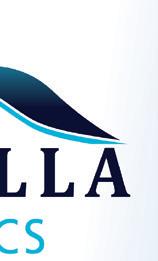
NEW PRACTICE DETAILS:
Website: brindabellaorthopaedics.com.au


1/7 Napier Close, DEAKIN, ACT, 2600 Phone: 02 6210 8777 E-mail: admin@bortho.com.au
of Health and through advice from clinical experts through the AMA, medical colleges, associations and societies.
What’s in the latest update?
An update to 247 items on the AMA Fees List came into effect on 1 November 2022 to reflect changes that occurred on the MBS from 1 March 2022 to 1 August 2022. The changes include 36 new items, 126 descriptors amended, 61 deleted and 21 revised fees.
How has the website changed?
As part of the November update, the AMA has taken the opportunity to refresh and modernise the website to improve users’ experience, including a mobile-friendly format. Underlying functionality and content remain the same.
These days, the AMA Fees List is delivered exclusively online.
Lunchtime AMA Fees List Workshop
AMA ACT is holding a lunchtime AMA Fees List Workshop for practice managers on Friday 9 December, exclusively for AMA members and licensed non-members. To register for the workshop or enquire about membership, contact AMA ACT on 6270 5410
more than 1,300 responses. An alarming 240 patient complications were reported.
The most common issues reported were misdiagnosis of conditions such as chlamydia, herpes and gonorrhoea. At least six pregnant women were sold antibiotics unsafe in the first trimester and one woman had a potentially life-threatening ectopic pregnancy which was misdiagnosed as a UTI.
Overseas experience
Advocates of pharmacy prescribing often point to the international experience, with Queensland Health Minister Yvette D’Ath citing “effective” models used in the
UK, Canada and New Zealand. However, Professor Robson said this was disingenuous.
“Those models work completely differently to this model,” he said. “The Queensland Government is comparing apples with oranges and pretending they are the same thing.”
For starters, it has been noted that in many countries where pharmacy prescribing exists, it mostly covers drugs already classified as Schedule 3 in Australia.1
New Zealand introduced pharmacy prescribing in 2013. Applicants must have a postgraduate clinical diploma or equivalent and have several years of clinical experience in a specialised area before applying for the 12-month postgraduate course. The UK introduced pharmacy prescribing in 2006. Most work in general practice.
Canada allows limited emergency prescribing and prescription extension powers in some territories. However, evidence from Canada may be viewed as a cautionary tale for Australia. Two former pharmacists writing in the Canadian Pharmacists Journal noted that pharmacists were seven times more likely to prescribe antibiotics than a doctor for a patient with a suspected UTI, based on a 2019 study.2
They reflected: “Are the data suggesting pharmacists can better detect UTIs than physicians do, even without physical examination and investigations? Or are the data suggesting pharmacists prescribe more due to better financial incentives?” they wrote.
1 Medicus, September 2022, p2
2 CPJ/RPC September/October 2019 Vol 152 No. 5, pp281-282.
[6]
ISSUE 4, 2022
CANBERRA DOCTOR: Informing the Canberra medical community since 1988
appointments available. Orthopaedic Splints and Plaster facility available on site.
l Shoulder
l Shoulder Replacements l Wrist Arthroscopy and Replacements l Distal Radioulnar Joint Replacements l Dupuytren’s Disease l Carpal and Cubital Tunnel Syndrome l Sports Injuries l Patient Focus Rehabilitation using Digital Medium
Policinski offers management of all upper limb orthopaedic injuries and conditions, with special interests in:
Arthroscopy
Continuedfrompage5
Staying on top of the Medicare Benefits Schedule (MBS) is a full-time job, with hundreds of items subject to changes each year. Thankfully, the AMA Fees List Team is dedicated to understanding the impact of those changes on practice costs and integrating that data into its Fees List. The 1 November 2022 update to the AMA Fees List is now available.
Come along!


[7] ISSUE 4, 2022
Tower Two Selling Now! Apartment Living Rede ned. Select from a new range of 1, 2 and 3 bedroom oor plans. 1 beds from: $450,000 2 beds from: $645,000 2 Bed + Media & 3 Beds from: $800,000 Developed and built by Be one of the rst to discover this new release! Scan me for more info! (*All information and prices were correct at time of print. Please contact us for exact pricing on date of enquiry. Min EER 5.2 - All images are artist impressions)
CANBERRA DOCTOR: Informing the Canberra medical community since 1988
Drs4Drs ACT: A Safe Space
AMA ACT calls for evidence-based investment in wellbeing
AMA ACT is urging the ACT Government to let evidence guide its investment of more than $8 million earmarked for health practitioner wellbeing.
The ACT Government announced a new $8.75 million Health Workforce Wellbeing and Recovery Fund in October. Health Minister Rachel Stephen-Smith said the fund will provide individual teams across ACT public health services the opportunity to propose initiatives that they believe will have the most impact and benefit for their teams.
AMA ACT President, Professor Walter Abhayaratna welcomed the significant investment to tackle the crisis of burnout and suicide in the public health system. However, he said any wellbeing initiatives should be evidence-based.
“Burnout and wellbeing affect individuals, but these issues begin in the workplace,” Professor Abhayaratna said. “These are system issues, and so they require structural and sustainable solutions, which means laying the groundwork and not just rushing into interventions.”
“We need to use an evidence-based model for wellbeing that can be adapted to different sectors of the workforce, that is scalable and sustainable,” he said.
“I would urge the ACT Government to begin by working out the best model and then collecting data, by surveying those who work in the health system about their experiences and the help they need,” he added.
A proven model
Delegates at October’s Drs4Drs
ACT Safe Space event in Barton last month heard about the Stanford WellMD Model of Clinician Wellness and Professional Fulfilment, regarded by many as the world’s best thinking on the issue.
Developed by clinicians at Stanford Medicine and Mayo Clinic, the evidence-based model can be used to drive wellness programs across diverse healthcare organisations, including targeted initiatives for doctors in different specialties, nurses and allied health professionals.
Whereas some wellness models
emphasise Personal Resilience, the Stanford Model recognises resilience as just one important part of the “wellbeing pie” [see image]. Far more influential are system-wide factors, which can be broken down into Culture of Wellness and Efficiency of Practice
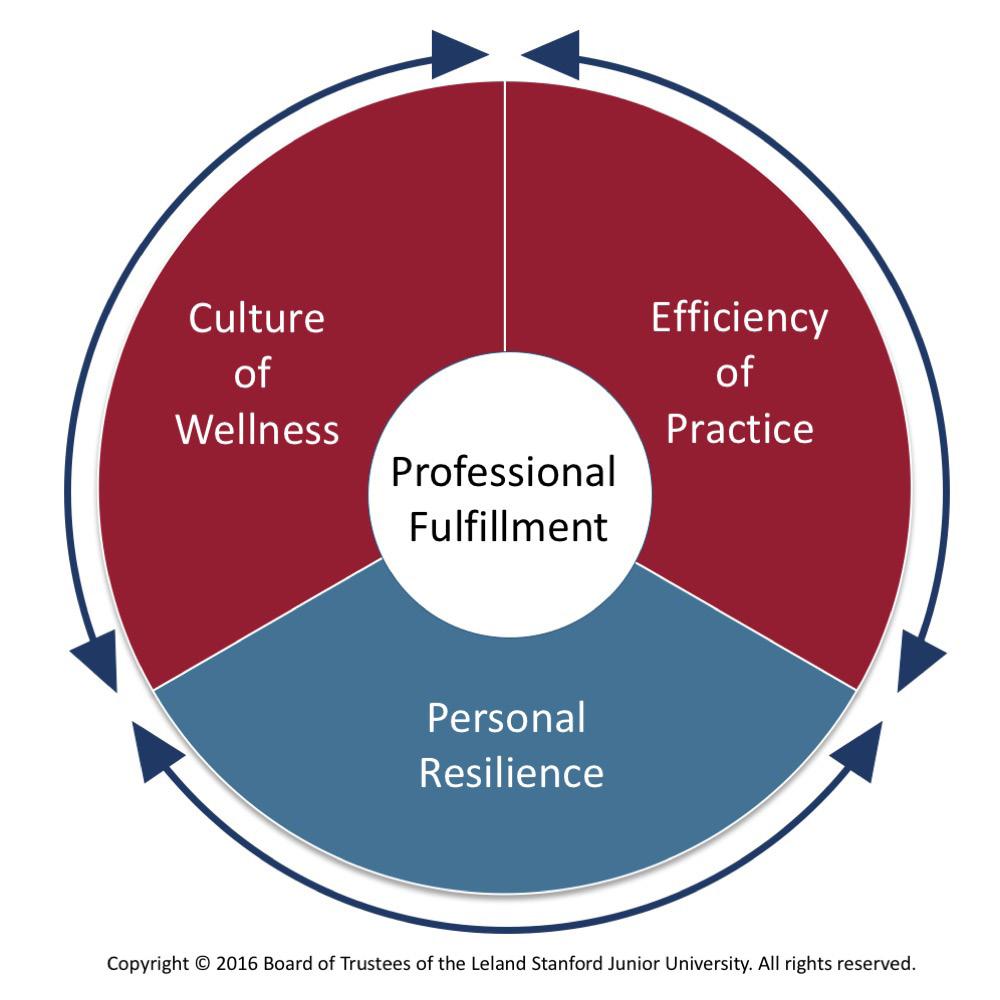
Culture of Wellness includes aspects such as:
leadership styles and development collegiality
safe spaces
rest times leave entitlements
Efficiency of Practice includes aspects such as:
paperwork
digital records scheduling
The Stanford Model’s creators say it’s best for each department or work unit to develop its own tailored wellbeing initiatives.
“Although broad interdisciplinary initiatives may have great political
appeal, their execution often becomes diffuse and ineffectual,” wrote Dr Tait Shanafelt and colleagues in Academic Medicine in 2019.*
CARING FOR DOCTORS


We’ve been looking after doctors and their families in the ACT and NSW for over 125 years, offering confidential financial assistance and counselling support in times of adversity or crisis. Whether your issue relates to work, family, addiction, health, loss or financial hardship, we are here to ensure you have the best chance of a full recovery.
Our support is free, independent, non-judgmental and does not require a referral.
So, if you or a colleague has fallen on hard times, please call our Social Work Team on 02 9987 0504 for a confidential chat.
If you don’t need our help now, please show your compassion and support us with a tax-deductible donation so we can continue this vital work. Visit our website www.mbansw.org.au for INFORMATION or to DONATE.
MEDICAL BENEVOLENT ASSOCIATION OF NSW
BY DOCTORS FOR DOCTORS
In that same paper, they noted that different sections of the health workforce face different stressors. For instance, dominant stressors for doctors included isolation, malpractice suits, excessive work hours, call schedule and having ultimate responsibility for medical decisions. By contrast, dominant stressors for nurses included patient death and suffering, moral distress, inadequate compensation and mistreatment by other team members.
In practice
The Stanford Model has been used by health systems around the world to create iterative changes that improve health practitioner wellbeing. The first hospital in Australia to have adopted the Stanford Model is Royal Prince Alfred Hospital (RPAH) in Sydney, in partnership with NSW Health and RPAH’s Dr Bethan Richards – Australia’s first Chief Medical Wellness Officer.
With buy-in from stakeholders across the organisation, the hospital has
begun collecting robust and honest real-time feedback data from staff to enable practical solutions to the barriers doctors face to wellbeing.
Some initiatives at RPAH include mentorship programs and workshops, goal-based exercise programs, events to increase social connections and implementing protected lunch breaks for Doctors in Training.
AMA ACT survey
Ahead of the recent Safe Spaces event, AMA ACT surveyed around 100 doctors and medical students about their wellbeing.
The biggest barrier they reported to wellbeing and professional fulfilment was being “time poor”. Many doctors reported excessive workload, red tape and staff shortages.
Some 43% of respondents were non-GP specialists, 16% were GPs and 16% were students and doctors in training.
* Building a Program on Well-Being: Key Design Considerations to Meet the Unique Needs of Each Organization. Academic Medicine: February 2019. Vol 94. Issue 2. p156-161
[8] CANBERRA
1988 ISSUE 4, 2022
DOCTOR: Informing the Canberra medical community since
Medical Benevolent Association of NSW
The Stanford Model identifies three broad interrelated factors influencing professional fulfilment and wellbeing, with system-related factors in red.
Hardwire a culture of care in your team
instance, they might be asked: “Which year in your life stands out as being your best yet?”
Each session, participants share the best 5% of things that have happened for them in the last quarter, and the worst 5%.
Dr Dawda, who facilitates the sessions, explained: “We don’t just focus on the bad, but also on the good, which creates balance to our conversation and reflections.”
Four times a year, team members from the Next Practice network of General Practices gather to debrief about work and life.
It sounds simple, but Dr Paresh Dawda, director of healthcare consultancy Prestantia Health and Dr Sam Prince, co-founder of Next Practice Deakin, say these Peer for Peer meetings are key to hardwiring a culture of care among the practice team.
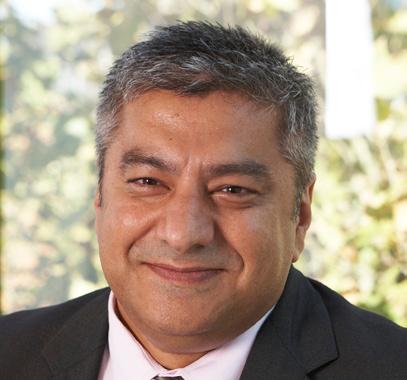
“Your phones are off, you never miss a session and you get to really know your colleagues,” Dr Dawda told delegates at the Drs4Drs Safe Space event in Barton last month.

Meetings are highly structured, with participants sharing in response to questions designed to help them grow empathy for one another. For
“When people share their struggles, the aim is not to provide solutions, but to create empathy leading to trust,” he added. There is strict etiquette about confidentiality, punctuality and even homework.
The theory
Dr Dawda’s enthusiasm for Peer for Peer meetings began with his experience of what are known in the US and the UK as “Schwartz rounds”, named after Boston attorney, Ken Schwartz, who died of lung cancer in his 40s in 1995.
Dr Dawda cited a UK study which found healthcare staff who attended Schwartz rounds where they had the opportunity to talk about their social and emotional health had improvements in psychological wellbeing. Before attending Schwartz rounds, 25% of respondents showed
high levels of psychological distress. After the intervention, this fell to 12%. By comparison, there was little change in psychological distress rates among non-participating sites. Dr Dawda said he had experienced first-hand the benefits of integrating Schwartz rounds, or Peer for Peer meetings, into a healthcare organisation. “It really can be cathartic for people to share with colleagues once they have learned they can trust one another,” he said. “It is important that vulnerability is modelled, particularly from senior team members.”
A learning system
Next Practice routinely surveys the practice team about their social and emotional experience at work. The team members are asked how they feel about their role and purpose, how they get along with their team, what level of trust they have in management, and how supported they feel in their roles.
The feedback to date has been overwhelming positive. While some still report feeling stressed, ‘happy’ is the major theme that comes through in their responses.
“What we’re trying to do is activate peoples’ agency,” Dr Dawda said. “It’s about creating a
Staying in control as a junior doctor
The best of times
It wasn’t always bad – Dr Phang said she had a fantastic experience at a different Queensland health service in her second hospital year.
learning system, where we look at the data and intervene to help shape the culture that will be best for our staff, clinicians and our patients. This is essential for innovation in healthcare.”
Dr Dawda said any workplace that wanted to cultivate compassion among its team members had to recruit to values, especially for those in leadership roles. “Getting involved in Peer for Peer is a great way for leaders to role-model a learning culture with their own teams – if leaders are brave enough to share their own development goals and efforts,” he said.
“Word gets around really quickly when the workplace has a positive culture,” he added. “People will elect to come work with you because they believe in that culture and that will then become self-perpetuating.”
2. Having support from a psychologist and later, a life coach, who helped her focus on the things within her control such as eating well and exercising
Dr Phang began with the story of her “nightmarish” first day as an intern at 30bed hospital in remote Queensland. That evening, the orderly wheeled in a patient who had an NSTEMI and was awaiting transfer by the Royal Flying Doctor Service. She was the only doctor on duty in the hospital.
“The nurses were asking me, ‘What’s the plan? What’s the plan?’ and I had no idea because there had been no handover,” she said. “I didn’t know what to do and I had no idea how the system worked because no one had given me an orientation.”
Dr Phang also shared her experience of bullying at another hospital, where she would “go to bed at night dreading work the next morning” because the senior register shouted at the junior doctors.
“This hospital worked hard to promote a culture of kindness,” Dr Phang said. “The hospital was well-staffed, so the rosters were fair. Residents and registrars got to experience a variety of rotations, not just cover afterhours shifts.”
This hospital prioritised protected teaching time – taking intern pagers away and looking after them while they attended teaching. It also dedicated an entire lounge that was endearingly referred to as the ‘Qantas lounge’ where doctors could hold handovers, have meals, showers and rest. “Working there felt like being part of a community,” Dr Phang said.

Staying in control
Dr Phang said there were many times when it would have been easy to walk away from medicine. She said there were three things that helped her stay and maintain her wellbeing:
1. Having a hobby outside of medicine – in her case, hosting her Junior Doctor’s Corner podcast
3. Making choices that were in line with her values.
Dr Phang said even though a hospital work environment can feel completely out of a junior doctor’s control, any junior doctor can empower themselves by putting their hand up to help make change happen.
“There’s a lot of breath-holding in junior doctors,” she said. “As in, ‘Hold your breath and get through it, even if you start turning blue, it’s such flawed thinking.”
“I would urge junior doctors to get a seat at the table, whether it’s AMA council or a hospital committee, and help shift the systemic issues within a hospital into their circle of influence and control.”
[9] ISSUE 4, 2022
CANBERRA DOCTOR: Informing the Canberra medical community since 1988
Dr Dana Phang
Dr Dana Phang, a fellow of the RACGP moved to Canberra this year to work as a GP at Hobart Place General Practice. She spoke at the Drs4Drs Safe Space event about the best and the worst of her years as a junior doctor, and how she coped in the darkest times.
Dr Paresh Dawda
The 24/7 Drs4Drs ACT Helpline is 1300 374 377
Word gets around really quickly when the workplace has a positive culture. People will elect to come work with you.
Some welcome down payments, but 2023 must be a health budget

The
What the budget included: What was left out:
$750 million for the Strengthening Medicare Fund, established to fund primary healthcare reforms
$229.7 million in GP infrastructure grants of up to $50,000 each, to support general practices to enhance digital capability, invest in infection control and meet accreditation standards

How ports doc
$143.3 million to support access to healthcare in rural and regional areas
The latest budget did nothing to address the longrunning logjam facing public hospitals. AMA has been calling for 50/50 funding between the state and federal governments, and removal of the arbitrary 6.5% cap on federal hospital funding growth
$2.5 billion investment in aged care and a commitment to provide funding to support a pay increase for aged care workers
Extra money for Aboriginal and Torres Strait Islander people’s health
ancer care: C A ds for all
No additional funding to enable GPs to provide care after hours and in aged care
No sugar tax or other preventative health initiatives
“Time is running out for our overstretched health system,” said AMA President Professor Steve Robson. “The AMA needs to use the next six months to prepare a package of measures to deliver additional investments in health that address the crisis in our ramped public hospitals, further support our overworked GPs and reform the private health system.”

Funding to begin scoping for a Centre for Disease Control
Read AMA’s Plan to Improve Access to GPs at ama.com.au/improve-access-to-gps
ow Cancer Council ACT supports octors to provide the best cancer care:
ncer services
Funding for the development of a National Health and Climate Strategy and the establishment of a National Health Sustainability and Climate Unit
No further funding for several key COVID-19 related support measures for public hospitals, aged care and general practice, which are due to end by 31 December this year
How Cancer Council ACT supports doctors to provide the best cancer care:



How Cancer Council ACT supports


doctors to provide the best cancer care:
Cancer services directory
directory
How Cancer Council ACT supports doctors to provide the best cancer care:
Access an extensive listing of services across Canberra and surrounds for all aspects of cancer care, from wellbeing to practical needs and ongoing support Cancer information resources
cess an extensive listing of services across Canberra and surrounds for all pects of cancer care, from wellbeing to practical needs and ongoing support. ncer information resources
Cancer services directory
Cancer services directory
Access an extensive listing of services across Canberra and surrounds for all aspects of cancer care, from wellbeing to practical needs and ongoing support.
Cancer information resources
Cancer information resources
Access digital and printed copies of booklets, pamphlets and information sheets on cancer types, cancer care and cancer prevention
cess digital and printed copies of booklets, pamphlets and information sheets cancer types, cancer care and cancer prevention.
13 11 20 information and support phone line
Access an extensive listing of services across Canberra and surrounds for al aspects of cancer care, from wellbeing to practical needs and ongoing supp Cancer information resources
Access digital and printed copies of booklets, pamphlets and information sheets on cancer types, cancer care and cancer prevention

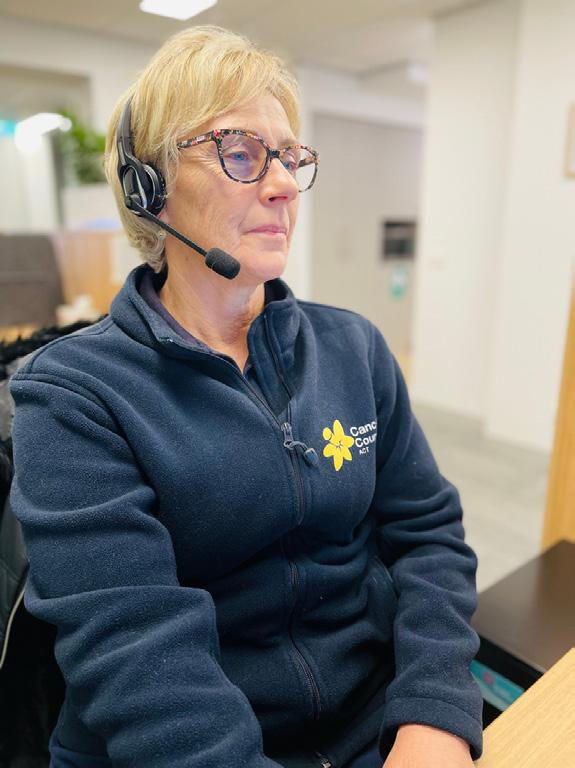

13 11 20 information and support phone line
11 20 information and support phone line r tools and resources to help support people living with cancer, call to talk to r healthcare professionals, 9am 5pm, Monday to Friday



Access digital and printed copies of booklets, pamphlets and information sheets on cancer types, cancer care and cancer prevention.
For tools and resources to help support people living with cancer, call to talk to our healthcare professionals, 9am 5pm, Monday to Friday.
Access digital and printed copies of booklets, pamphlets and information s on cancer types, cancer care and cancer prevention.
13 11 20 information and support phone line
l our Cancer Support Coordinators today and find out we can help you: cancer.information@actcancer.org
Email our Cancer Support Coordinators how we can help you: cancer.informatio
www actcancer.org (02) 6257 9999 Unit 1, 173 Stricklan n
For tools and resources to help support p l l h e our healthcare professionals, 9am 5pm, Email our Cancer S rdinators to h yo nformation@
13 11 20 information and support phone line
www actcancer.org (02) 6257 9999
www actcancer org (02) 6257 9999
Unit 1, 173 Strickland Cresc
Unit 1, 173 Strickland Crescent, Deakin ACT 2600
For tools and resources to help s n to talk to our healthca f ionals, 9a o nc rt Coordin f elp you: cancer.infor c
www actcancer.org (02) 6257 9999
U Crescent,
Informing the Canberra medical community since 1988
For tools and resources to help support people living with cancer, call to tal our healthcare professionals, 9am 5pm, Monday to Friday.
Email our Cancer Support Coordinators today and find out how we can help you: cancer.information@actcancer.org
www actcancer.org
(02) 6257 9999
Unit 1, 173 Strickland Crescent, Deakin ACT 2600
as ing support. C A mation sheets on 1 Fo all to talk to ou Ema how p y @ g www actcancer. (02) 6257 9999 Unit 1, 173 Strickland Crescent, Deakin ACT 2600
[10]
ISSUE 4, 2022
Federal Government’s 2022-23 Budget, delivered last month, contained some welcome new spending on general practice and aged care. However, with the health system under so much pressure, AMA has urged the government to ensure its May 2023 budget puts health front and centre, including delivering an improved GP funding model.
Big turnout for GP Policy Forum
“It was encouraging to see that both the Health Minister Rachel Stephen-Smith and the Minister for Mental Health and Disability Emma Davidson had a high level of awareness of the issues and where the challenges lie,” Dr Aust said.
GPs were surveyed in advance about the topics they wanted discussed, which Dr Aust said led to productive engagement.
Issues raised included:
The need to ensure that general practice has the coordinating role when it comes to integrative care.
Identifying novel funding opportunities to support disadvantaged members of the community to access the health system. There was general agreement that it is getting harder for the disadvantaged in the ACT to access health services as the health system becomes more stretched.
Opportunities to reduce wait times for initial appointments in the public hospital, including ‘referral pooling’. Cathie O’Neill of Canberra Health Services (CHS) clarified that no GP should be asked for a named referral.
Improving the link to the Digital Health Record (DHR) for GPs, subject to the findings of a pilot study. This would include providing a patient’s nominated GP with pending results on discharge.
Improving the process for notifying GPs of acceptance, triage and rejection of referrals.
Dr Kati Davies of YourGP@ Denman said it was good to bring together different stakeholders for updates and discussions.
“I personally had productive conversations with the Eating Disorders Group and we were able to workshop and brainstorm around current problems,” she said.

However, she added: “Unfortunately until there is political commitment to true collaboration and suitable funding arrangements between the feds, local government and primary healthcare, there will always be inefficient and unequal provision for consumers.”
“Digital health solutions go some way to address the communication shortfalls between separate healthcare groups but are inadequate for bridging the total system divide,” Dr Davies added.

The evening included presentations from:
Dr Melinda Choy, ACT Health Policy Advisor on the
complexity of general practice
Cathie O’Neill, Chief Operating Officer at CHS on issues related to outpatients at CHS
Associate Professor Rohan Essex on the DHR
Deborah Anton, Deputy Director-General, ACT Health Directorate on updates on key ACT Health/CHS projects such as the new northside hospital, the Urgent Care Centres, the new integrated health hubs and bilateral Commonwealth mental health agreement.
The program featured a Q&A panel with Rachel Stephen-Smith and
Emma Davidson and roundtable discussions on Suicide Aftercare and Prevention, Integrated Care, Public Health and GPs, Calvary Public Hospital Bruce Emergency Department, Improving Territorywide Safety and Quality of Care and the Eating Disorders Program.
Among the attendees were Dave Peffer, CEO of CHS; Megan Cahill, CEO of Capital Health Network; Professor Kirsty Douglas, Director of the Academic Unit of General Practice at ACT Health; Robin Haberecht, General Manager of Calvary Public Hospital; and Dr Anne-Marie Svoboda, director of the GP Liaison Unit at CHS.
[11] ISSUE 4, 2022
CANBERRA DOCTOR: Informing the Canberra medical community since 1988
Around 65 GPs attended the ACT Health Directorate’s 2022 GP Policy Forum in Phillip last month. AMA ACT President Elect, Dr Kerrie Aust said the night was a valuable opportunity to engage with public health system leaders on pertinent health issues affecting the Canberra community. S P E C I A L OFF E R 14 M O NT H S F O R 12 Fur ther information: membership@ama-act.com.au Join in November and receive membership to the end of 2023 AVAILABLE TO ALL NEW MEMBERS Work related stress • Concern for a colleague Relationship issues Psychological disorders Alcohol or substance misuse • Physical impairment General health Drs4Drs ACT offers an independent & free confidential support service for doctors and medical students Who’s looking after you? ama.com.au/act/drs4drsact ACT Helpline: 1300 374 377 (24/7 days)
Physician, heal (not) thyself
The limits of self-care and prescribing
DR JULIAN WALTER Medico-legal Adviser, MDA National
The doctor who called us was stunned. They had been reported to Ahpra and were being investigated for self-prescribing. “It’s my business if I prescribe to myself; and anyway, these were not Schedule 8 medicines!”

And so began a discussion of how the Medical Board views self-treatment by medical practitioners, and how this has changed over the years.
There is broad recognition that our health and wellbeing impacts on our practice, and we are extolled to accept self-care as a cornerstone of professional life. However, there are distinct limits to the self-care we can and should provide to ourselves.
Stepping into providing ourselves care that only a registered health practitioner could deliver, likely means we are stepping outside the Medical
Medical practitioners should not be self-prescribing
This isn’t just a reference to selfprescribing Schedule 8 drugs (which most jurisdictions restrict or prohibit) or select Schedule 4 drugs, including drugs of dependence. It refers to ALL prescriptions by a practitioner for themselves. In addition, practitioners risk breaching the specific, varying, and complex legislative restrictions on self-prescribing in each jurisdiction – ranging from full self-prescribing prohibition (Victoria) through to restrictions on prescribing Schedule 8 drugs and some Schedule 4 medicines (Queensland, ACT, NSW, potentially WA/NT); or restrictions on self-prescribing Schedule 8 drugs. Such breaches may be a criminal offence.
Board’s Code of Conduct guidelines, with the risk of poor care outcomes or investigation.
Every year, there are examples of practitioners who have registration-impacting outcomes at Tribunals resulting from inappropriate self-care and care boundaries.
Section 11 of the Code, a relatively recent addition, talks about managing one’s own health. This section reflects similar constraints to the provision of care to close friends, family, and those you work with, discussed in section 4 (which was also updated).
Health practitioners should have their own GP
While I’m sure we all subconsciously self-diagnose at times, the value of independent objective workup, investigation and treatment cannot be overstated. This includes the importance of approaching your treating team for documents like medical certificates, and not issuing these yourself.

The doctor who called us was stunned. They had been reported to Ahpra and were being investigated for self-prescribing... and so began a discussion of how the Medical Board views selftreatment.
Extracts from the Medical Board’s Code of Conduct
11.2 Your health
Good medical practice involves:
• 11.2.1 Having a general practitioner.
• 11.2.2 Seeking independent, objective advice when you need medical care, and being aware of the risks of self-diagnosis and self-treatment.
• 11.2.3 Seeking help if you are suffering stress, burnout, anxiety or depression.
11.2.4 Making sure that you are immunised against relevant communicable diseases.
• 11.2.5 Not self-prescribing.
• 11.2.6 Recognising the impact of fatigue on your health and your ability to care for patients, and endeavouring to work safe hours wherever possible.
• 11.2.7 Being aware of the doctors’ health program in your state or territory which provides confidential advice and support through the doctors’ health advisory and referral services.
Reassurance about mandatory reporting
11.2.8 If you know or suspect that you have a health condition or impairment that could adversely affect your judgement, performance or your patient’s health: not relying on your own assessment of the risk you pose to patients
Seek advice
There is additional emphasis on the importance of seeking advice in relation to health issues that could impact your work, including stress, burnout and mental health.
Call for a doctor
AMA ACT maintains a list of doctors who have an interest in looking after the health of their colleagues. To be put in touch contact 6270 5410. Drs4Drs ACT is also available: a telephone call-back help line, providing independent and confidential advice to medical practitioners and medical students. They handle calls relating to stress and mental illness, drug and alcohol problems and relationship and other personal issues.
Where doctor-patients follow their treating team’s advice on whether their health issue impacts on work and how they should manage this (including modifying their practice), there should be no basis for a mandatory report. Complaints are generally straightforward to deal with if the doctor has sought and followed their treating practitioner’s advice. It is more common for doctors who don’t have a treating team to find themselves in difficulty if a concern about health impairment is made to a health complaints body. Tragically, we are also aware of terrible outcomes arising when doctors attempt to manage their own substance misuse or significant mental health conditions.
consulting your doctor about whether, and in what ways, you may need to modify your practice, and following the doctor’s advice.
4.15 Providing care to those close to you
Whenever possible, avoid providing medical care to anyone with whom you have a close personal relationship. In most cases, providing care to close friends, those you work with, and family members is inappropriate because of the lack of objectivity, possible discontinuity of care, and risks to the patient and doctor. In particular, medical practitioners must not prescribe Schedule 8, psychotropic medication and/or drugs of dependence or perform elective surgery (such as cosmetic surgery) to anyone with whom they have a close personal relationship.
• In some cases, providing care to those close to you is unavoidable, for example in an emergency. Whenever this is the case, good medical practice requires recognition and careful management of these issues.
View the references online: mdanational.com.au/physician-heal-thyself
[12]
ISSUE 4, 2022
CANBERRA DOCTOR: Informing the Canberra medical community since 1988
IN BRIEF
Canberra Script
Graduation breakfast
All AMA members are invited to AMA ACT’s annual Graduation Breakfast to celebrate this year’s crop of graduates from the ANU Medical School.

The event at Hotel Realm in Barton from 8.30-10am on Friday 16 December is free to graduating students and AMA members. For everyone else, it’s $40 per head. Partners and
friends are welcome to attend.
AMA President Dr Walter Abhayaratna said the Graduation Breakfast is a highlight of the year.
“It’s a time to celebrate and welcome our dedicated young peers, and it’s a wonderful way to round out the year,” he said.
RSVP by 9 Dec to 6270 5410, or reception@ama-act.com.au
canberrascript.act.gov.au
monitoring system, Canberra Script.
Canberra Script has been designed to reduce harms and preventable deaths in the ACT community by supporting the safe and effective use of monitored medicines.

It is a one-stop shop for prescribers to submit, renew and revoke Chief Health Officer (CHO) approval applications for monitored medicines.
The webinars will be held on November 22 (Tuesday) 5-6pm and December 14 (Wednesday) 11-12pm. Scan the QR codes to register.

Stroke care excellence
The Canberra Hospital and Calvary Public Hospital have been nationally recognised for their excellence in caring for and treating patients with stroke.
Announced at the 2022 Australian Stroke Coalition Quality Stroke Service Awards, the Canberra Hospital and Calvary Public Hospital were two of 12 hospitals officially honoured across Australia as top-performing
hospitals that achieved bestpractice stroke clinical care. The awards were based on nine quality care indicators for stroke treatment, in line with national stroke guidelines and national Acute Stroke Clinical Care Standards. The Canberra Hospital also received a Merit Award for providing timely endovascular clot retrieval treatments, the highest award for this category.
[13] ISSUE 4, 2022
NEWS
CANBERRA DOCTOR: Informing the Canberra medical community since 1988
Script: approvals hub real time prescription monitoring, shop for prescribers to submit, renew (CHO) approval applications for about the CHO approvals hub in Canberra your practice. Webinar Session 3 (Tuesday) December 14 (Wednesday) 11–12pm Canberra Script: Your CHO approvals hub
Did you know that, in addition to real time prescription monitoring,
Script is a one-stop shop for prescribers to submit, renew and revoke
approval applications for monitored medicines? Join ACT Health to learn more about the CHO approvals hub in
Script and how this can benefit your practice. Webinar Session 2 Webinar Session 3 November 22 (Tuesday) 5–6pm December 14 (Wednesday) 11–12pm Register now Register now
Canberra
Chief Health Officer (CHO)
Canberra
A News Magazine for all Doctors in the Canberra Region
ISSN 13118X25

Published by the Australian Medical Association (ACT) Limited Level 1, 39 Brisbane Ave, Barton (PO Box 560, Curtin ACT 2605)
Editorial: Sarah Colyer sarah-colyer@ama-act.com.au
Typesetting: Poyo Studio hello@poyostudio.co
Advertising: Ph 6270 5410, Fax 6273 0455 reception@ama-act.com.au
Articles: Copy is preferred by email to execofficer@ama-act.com.au in “Microsoft Word” or RTF format, (not PDF) with graphics in TIFF, EPS or JPEG format.
Disclaimer
No more butts: 15th annual Art In, Butt Out winner announced
Melba Copland Secondary School student, Antonella Zlatar has won the fifteenth annual ‘Art In, Butt Out’ competition.

Minister for Health Rachel Stephen-Smith announced the winning entry.
‘Art In, Butt Out’ is a longrunning initiative of AMA ACT and its Tobacco Task Force that sees Year 8 students from around Canberra put their design and marketing skills to the test to come up with a poster aimed at reducing the number of young people who smoke.
Ms Stephen-Smith said the ACT Government strongly supported the competition.
“I’m excited to see another powerful ‘Art In, Butt Out’
artwork representing a key message from young Canberrans about the harms caused by smoking,” Minister Stephen-Smith said. “This initiative provides an opportunity for young people in the ACT to communicate with their peers through different formats and ideas.”
AMA ACT President Professor Walter Abhayaratna said all the entries were of a very high standard.
“Antonella’s winning entry was bold and eye-catching with the clear message
‘No more butts’, which we hope will help influence teenagers to think twice about taking up smoking or convince them to quit,” Prof Abhayaratna said.
More help for veterans
Veterans who might benefit from support to build social connections or gain civilian employment may be interested in the Department of Veterans Affairs’ (DVA) social wellbeing and employment pilot program.
Veterans who participate in this pilot program will be allocated a professional consultant who will develop an activity plan that aligns with their individual goals and needs in their civilian life.
There’s no need for veterans to have had their health condition accepted as being related to their Australian Defence Force service, there is no cost to take part, and a written referral is not required.

In other DVA news, access to allied health care services and the Rehabilitation Aids Program has recently been expanded to eligible DVA clients in residential aged care, regardless of their care level.
Allied health care providers will no longer be required to seek prior approval to deliver services to DVA clients who were previously classified as high care. Provision of these services should not duplicate those the aged care facility is already funded to provide through other Government support.
For more information contact DVA Health Provider enquiries on 1800 550 457.


Medical students, share your stories!
Canberra Doctor is seeking submissions from medical students for our final issue of the year.

We’d love to read your reflections on your years at medical school and how you feel about what lies ahead. What surprised you? What
made you laugh or cry? What memories will stick with you?
Entertain and inform us. The best submission will receive a Littmann Classic III Stethoscope.
Email submissions to sarah-colyer@ama-act.com.au by Friday 2 December 2022
[14] CANBERRA DOCTOR: Informing the Canberra medical community since 1988 ISSUE 4, 2022
5410
Antonella Zlatar with her winning entry, beside Health Minister Rachel Stephen-Smith.
Phone: 6270
Email: reception@ama-act.com.au
The Australian Medical Association (ACT) Limited shall not be responsible in any manner whatsoever to any person who relies, in whole or in part, on the contents of this publication unless authorised in writing by it. The comments or conclusion set out in this publication are not necessarily approved or endorsed by the Australian Medical Association (ACT) Limited.
The betweenreferralby andconsultation specialist where patient oftenofficially added anelectivesurgerywaiting knownas ‘hidden’waiting newAMA explains. reportsays impossible patients informed decisionsaboutwhether waitforsurgeryinthe hospital throughtheprivate hospital withoutknowing howlong willwait AMA calls for ‘hidden waiting list’ data Issue 3, 2022 Canberra Doctor is proudly brought to you by the AMA (ACT) Limited. Circulation: 1,900 in ACT region Informing the Canberra medical community since 1988 Doctor CANBERRA The AMA calling for nation-wide transparency the time it takes to see specialist in a public hospital. VOLUME CANBERRA Informing Canberra medical community since reporting issue.However, evidence Victoria Queenslandshowspatientsare waiting longerthanwaiting time which days forurgentconsults 365 days non-urgentconsults. Forinstance, states,patients typicallywaited than150 for urgentinitialappointment gastroenterologist. non-urgentcases,waitingtimes close exceeded days ophthalmology,orthopaedicand noseandthroatappointments. Tackling backlog AMA Steve commented: “It’s wonder ourhealthsystemisn’tcoping when notcountingthe true people desperatelyneedcare. like countingemergencywaitingroom timeswithoutcountingthehours someone waiting ambulance to thewaitingroom.” Professor while Australian Health Welfare workingwith jurisdictions includeoutpatient waitingdata, nationalplan needednow addressthebacklog. “Weneed tackle backlogof because backlog thenumber peopleturningup droves GPpractices often sheerdesperationtoemergency departments,” said. Commonwealthcurrentlyfunds of“efficientactivity” public hospitals,with stateandterritory governmentsfundingtheremaining. Health Agreement, Commonwealth given only provideupto extra6.5per funding,basedon measure efficientgrowth. AMAiscallingfor 50fundingsplitbetween Commonwealth and and and the cap. the visitama. com.au/elective-surgeryhidden-waiting-list forJanuary March showed patients overduewaitingfor elective surgery 189more the previousquarter of17%). However,howlongpatientswait get waiting notpublicly inthe nor NSW. the averagewaitingtimes differentspecialistsonthe HealthNet However, system longeravailable,GPs patients leftguessinghow longthe be.Anecdotally, non-urgentCategory patients theACT years initial orthopaedicappointment,12-18 months ENTappointmentand 6-12 forgastroenterology andcardiologyappointments. Government provideCanberra with up-to-datefigures thewait initialoutpatientappointments, make deadline week. Victoria Queensland There nationally-consistent Waitingtimesfor outpatientappointments are publiclyreported. initialoutpatientappointment. “Forexample, patientwaitingfor non-urgentkneereplacementwould be thatthey bewaiting year morefor surgeryon electivesurgery list,however beaware thealmost yearwait outpatient appointment,” reportsays. Waiting ACT ACT Health QuarterlyPerformance • Circulation: 1,900 • Print and online • Range of sizes to suit your budget • Custom design service available Spread the word about your event, practice or organisation Get in touch with our team to find out more:
Professor Geoff Farrell MD, FRACP, FAHMS
Consultant Hepatologist, ANU Emeritus Professor of Medicine
One of Australia’s most experienced and dedicated liver specialists continues to be available to receive new patient referrals for investigation and management of liver diseases.






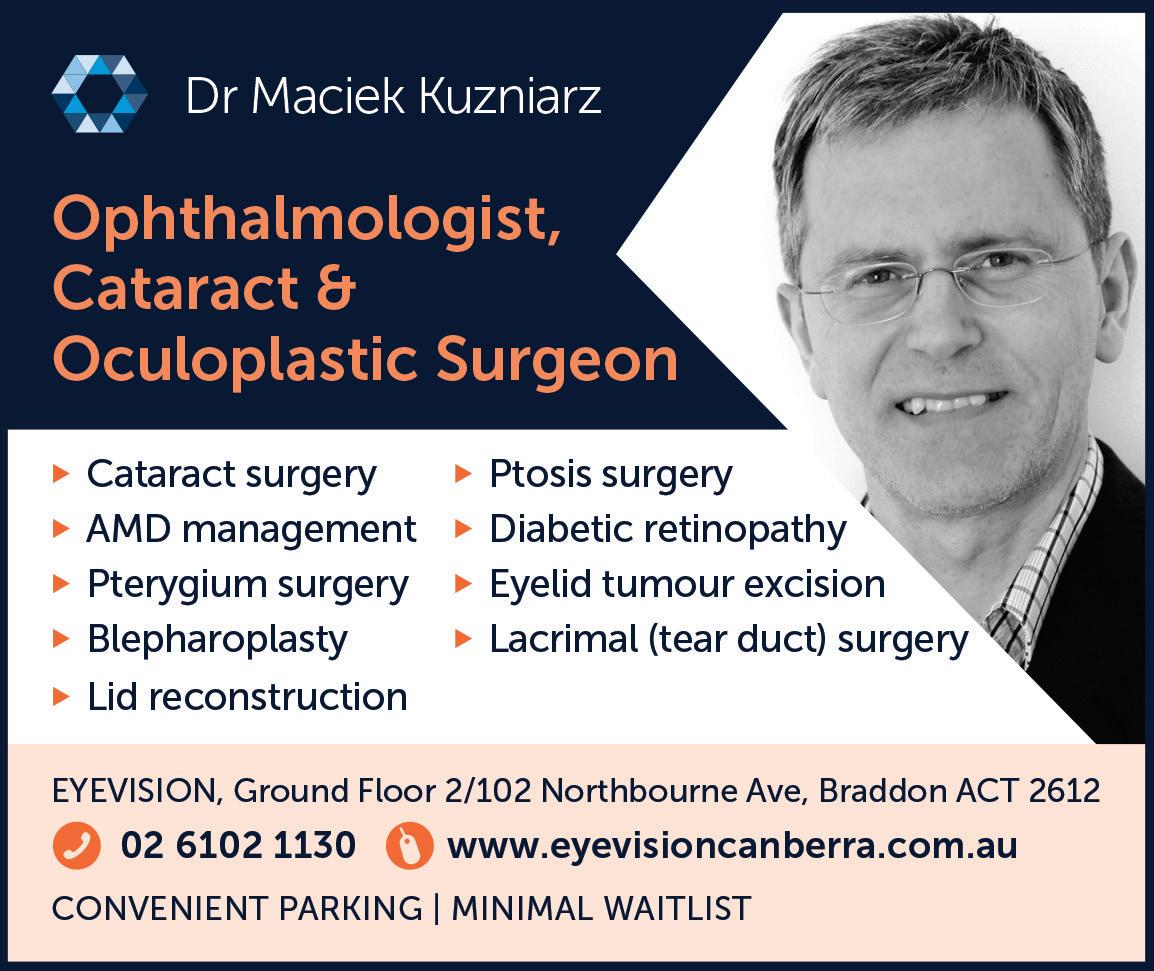
Professor Farrell welcomes the opportunity to provide you and your patients with expert assessment, management and monitoring of all aspects of liver diseases including: Diagnosis
• Comprehensive management plans
• Second opinion for complex cases


• Hepatitis B


• Evaluation of abnormal liver function tests



Fatty liver Cirrhosis (all causes) Liver tumours


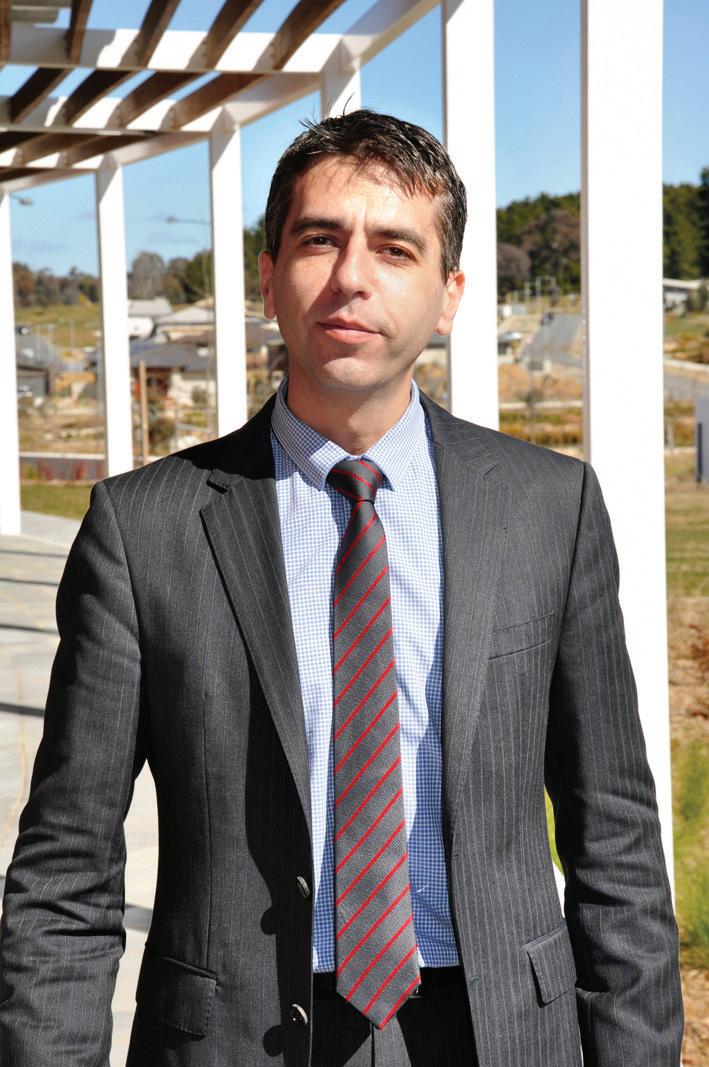
Professor Farrell shares private specialist consulting rooms with Dr James Riddell and Professor Narci Teoh. This specialist group works closely together to provide assessment and care across the spectrum of gastrointestinal and liver diseases. They are supported by a registered nurse, specialist medical receptionists and a co-located group of dieticians.




Professor Farrell’s contact details: Suite 1, Calvary Clinic, 40 Mary Potter Circuit, Bruce 2617 Fax: 6251 0977 Ph: 6251 0255

Dr Wisam Ihsheish

(Adel) FRACS (orth) FAOrthoA Knee arthroscopic surgery, hip and knee replacements and general orthopaedics
Acceptingnewreferralsin CanberraandGoulburn
[15] ISSUE 4, 2022 CANBERRA DOCTOR: Informing the Canberra medical community since 1988 A/Professor Ardalan Ebrahimi MBBS (Hons), MPH, FRACS Thyroid, Parathyroid, Head & Neck Surgeon l Thyroid surgery l Parathyroid surgery l Salivary gland surgery l Neck dissection l Skin cancer and reconstruction l Head and neck cancer l Pharyngeal pouch l Thyroglossal duct cysts and branchial cysts Urgent referrals will be seen within 72 hours A | Suite 11B. National Capital Private Hospital, cnr Gilmore Cres & Hospital Rd Garran ACT 2605 P | 02 5134 5934 F | 02 8331 6049 E | admin@canberraheadandneck.com.au W | canberraheadandneck.com.au l Shoulder Arthroscopy l Shoulder Replacements l Wrist Arthroscopy and Replacements l Distal Radioulnar Joint Replacements l Dupuytren’s Disease l Carpal and Cubital Tunnel Syndrome l Sports Injuries l Patient Focus Rehabilitation using Digital Medium Dr Igor Policinski MD FRACS(Ortho) HAND, WRIST, ELBOW, SHOULDER & TRAUMA Dr Policinski has trained and attained subspecialty Fellowships in Australia, USA and France. Dr Policinski offers management of all upper limb orthopaedic injuries and conditions, with special interests in: NEW PRACTICE DETAILS: Website: brindabellaorthopaedics.com.au 1/7 Napier Close, DEAKIN, ACT, 2600 Phone: 02 6210 8777 E-mail: admin@bortho.com.au NOW CONSULTING AT A NEW LOCATION IN DEAKIN Assoc/Professor Hodo Haxhimolla Suite 14, Level 5 National Capital Private Hospital Corner Gilmore Crescent & Hospital Road Garran ACT 2605 Ph: (02) 6281 7900 Fx: (02) 6281 7955 n Prostate cancer treatment n Peyronies disease n Robotic radical prostatectomy n Male incontinence n Robotic partial nephrectomy n Laparoscopic radical nephrectomy n Robotic pyeloplasty n Laser Treatment for BPH n Erectile dysfunction n Laser stone treatment n Penile Implant surgery n MRI guided prostate fusion biopsy Orthopaedic Surgeon CANBERRA 60/35 Torrens St, Braddon ACT 2612 Ph 6109 0002 Fax 6109 0003 GOULBURN ELLESMERE SPECIALIST CENTRE 56-58 Clifford St, Goulburn NSW 2580 Ph 4823 0223 Fax 4822 5417
MBBS
CANBERRA LASER AND GYNAECOLOGY CENTRE has RELOCATED his Gynaecology and Colposcopy practice to: Suite 9 John
Centre 175
Crescent Deakin
2600 He
providing the
services
Phone: 02
or 02
4920 Fax:
Email:
Dr. Philip Mutton
T H I S I S T O C E R T I F Y T H A T F O C U S O N Y O U R P A T I E N T S A N D L E T U S F O C U S O N T H E N U M B E R S BOOKKEEPING SERVICES Karen Groves Founding Director We understand the complexities of running a medical practice splitting income between doctors and reconciling your accounting system to your front office system Professional Responsive Outcome Driven P 02 6196 9496 E OFFICE@SUCCESSFULALLIANCES COM AU WWW SUCCESSFULALLIANCES COM AU 1. Workplace relations Advisors to help guide you through any workplace issues. 2. Lobbying and advocacy Advocacy on important issues that matter most to you. 3. Limited legal assistance General advice on routine legal matters
doctors. 4. Medical Journal of Australia 22 editions of the highlyrespected journal every year. To renew go to our website: ama.com.au/act Or contact the membership officer: membership@ama-act.com.au Renew your membership subscription now for 2023 8 Benefits of your membership: AMA ACT MEMBERSHIP RENEWAL 5. List of Medical Services and Fees Costing assistance and guidance on medical services and fees. 6. World-class membership portal Networking, peer mentorship, and professional opportunities. 7. Wellbeing support services Free and confidential 24/7 counselling and peer support. 8. Coaching services and career solutions Designed to support doctors across their entire career lifecycle.
James Medical
Strickland
ACT
will be
same
as previously.
6273 3102
6282
02 6285 3265
deakingynae@gmail.com
Dr. Philip Mutton
impacting
Leading support in your times of need – it’s why more doctors choose Avant
When the moment arrives, how confident are you in the quality of support you’ll receive? Avant offers unrivalled protection.
Award-winning defence
A 295-strong* team, including one of Australia’s largest medical defence law firms, recognised for their expertise, providing members with on-the-ground support across Australia.
Industry-leading insights
With half of Australian doctors as members, we handle more calls and cases. This wealth of insights and experience helps us determine the best approach for your matter, to achieve a positive outcome.

To request a quote or for more information, please contact:
Michael Carbery, Head of Growth - NSW/ACT 0419 279 286 | avant.org.au/practitioners
IMPORTANT:
10/22 (DT-2570)
Expert advice and risk management Prevention is better than cure. That’s why members have access to our medico-legal experts, 24/7 in emergencies, risk advisers and high-quality educational resources.
Professional indemnity insurance products are issued by Avant Insurance Limited, ABN 82 003 707 471, AFSL 238 765. The information provided here is general advice only. You should consider the appropriateness of the advice having regard to your own objectives, financial situation and needs before deciding to purchase or continuing to hold a policy with us. For full details including the terms, conditions, and exclusions that apply, please read and consider the policy wording and Product Disclosure Statement, which is available at avant.org.au or by contacting us on 1800 128 268. *Accurate as at 08/03/2022. MJN859
Dr Paul Scott Avant member














































































